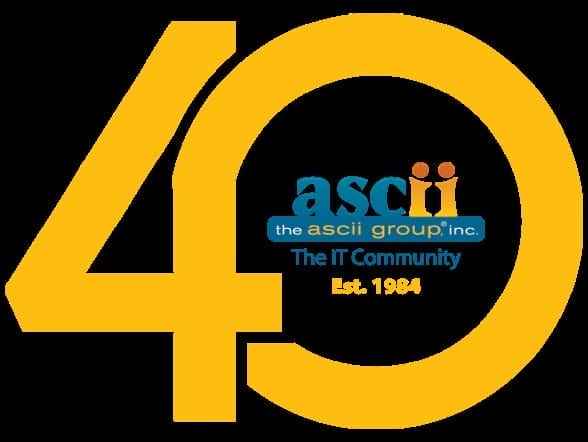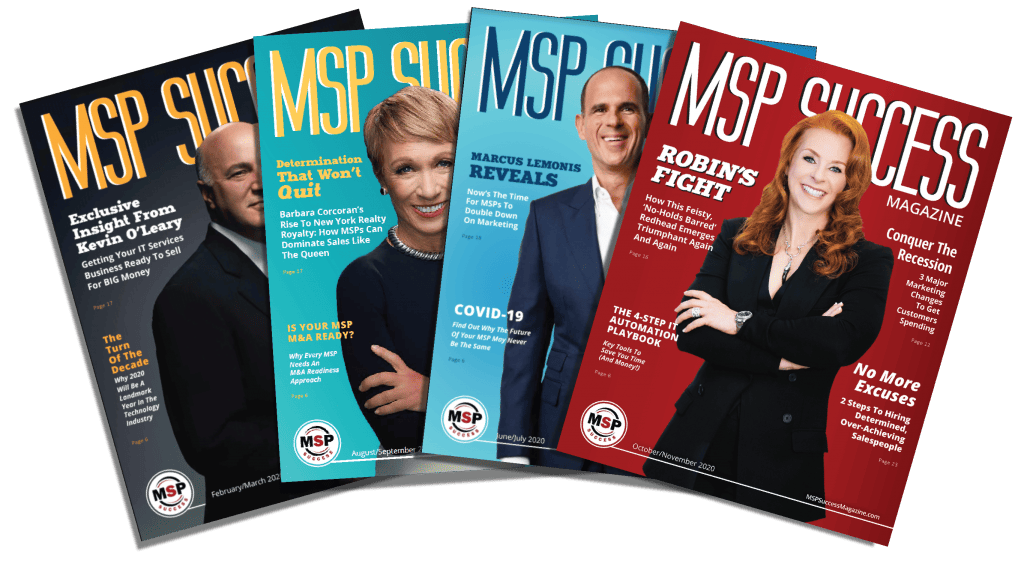Alan Weinberger founded The ASCII Group in 1984, the same year legendary tennis player Martina Navratilova achieved a 74-match winning streak during the season.
An avid tennis player himself, Weinberger has been on a winning streak as well. The ASCII Group is the oldest and largest independent IT community in the world, celebrating its 40-year anniversary of helping its members with the resources, programs, and tools to grow and manage their MSP businesses.
Weinberger’s mission has been unwavering throughout four decades: to advance small B2B tech entrepreneurs by giving them more influence and independence in the IT industry through buying power and community.
“As a group, they were the smartest people in the industry,” says Weinberger, reflecting back to 1984. “They knew how to sell and service and secure a platform and a device for an end user to run their business better. I thought by creating a community, it would give them leverage and power in the industry.”

What started as a membership-based buying group of 14 VARs has grown to more than 1,500 members in the U.S. and Canada with over 70 different programs and services. On average, ASCII members are MSP business owners who have five to seven employees with annual revenue of, or close to, $2 million—though the group has much larger members as well. Nearly 35% of members have been in business for 20-plus years. Last year, members made a total of $750 million in sales through ASCII Group distributor partners.
Putting A Spin On His Legal Roots
Weinberger grew up in Great Neck, New York, on Long Island. He initially followed the career path of his attorney mother (someone he calls “a trailblazer” who lived to 103), receiving his bachelor’s degree and Juris Doctor from New York University. He started his career with a big law firm on Wall Street. However, he always had an entrepreneurial bent, from a childhood lemonade stand to owning and operating his own tennis shop as a teenager.
He left Wall Street to earn his Master of Laws from Harvard and went on to become a founding professor at Vermont Law School, where he helped design and create the curriculum.
After two years of teaching and establishing the school, he moved to Washington, D.C. In the early 1980s, created an association for a group of Entre Computer Center dealers. They were part of a franchise that sold IBM computers; they formed the association because they wanted to branch out to sell other brands. When he was approached by another group of dealers to do the same thing, the concept of The ASCII Group was born.
The Yellow Ball Enters The Game
Sustainability is all about evolving. The sport of tennis is centuries old, but the yellow ball is relatively new. The International Tennis Federation (ITF) introduced it in 1972 to improve visibility for players as well as TV viewers.
ASCII, too, continues to evolve and make improvements that benefit MSPs. “Because the industry changes rapidly, we have to continue to add value for our members,” says Weinberger.
“I thought by creating a community, it would give them leverage and power in the industry.”
Alan Weinberger
Soon after its founding, The ASCII Group added problem resolution because its members expressed the need for help with vendor issues. Today, The ASCII Group has structured discounts with companies that will help MSPs run their businesses, such as business insurance, credit card processing, leasing, collection services, background checks, and more. Some of the tools and services ASCII members can avail themselves of include a national MSP IT Sales Tax Help Desk, an MSP Forecasting and Quoting Tool, a price comparison service, peer groups, and a subcontracting concierge service.
When asked what he sees as The ASCII Group’s most significant contribution to the channel, Weinberger says it is the trusted community its members have built.
“The ‘big win’ is what we’ve developed here,” agrees ASCII Group President Jerry Koutavas. “Instead of just looking at it as one significant win, like us helping our members drive business or our members getting access to all these resources, if you look at all those little individual pieces, they only matter if you look at the whole. There’s a million wins happening every day overall in the community.”
Stanley Louissaint, owner and CEO of Fluid Designs agrees. “ASCII has been a great addition to my business in more ways than one,” he says. “Although I joined ASCII to not feel like a solo business owner on an island, I gained much more than that—lifelong friends, a sense of community, PR opportunities, constant education about new offerings from vendors, and lastly, additional business.”
He says that additional business was a big, unexpected benefit. “I have worked with fellow peers in ASCII to help them towards successful outcomes towards their clients and vice versa.”
Longtime ASCII member (since 1996) Joshua Liberman, CEO of Net Sciences, points to the chief benefits of group buys, events, marketing, and legal help, along with “member knowledge and labor sharing. But the secondary benefit as an ‘extended family’ for many of us cannot be overestimated,” he says.
Mike Bloomfield, CEO of Tekie Geek, calls the ASCII community a “cornerstone” of his company’s growth. “It’s not just about the unparalleled access to resources and knowledge but also about being part of a community that champions success and support among its members,” he explains.
The ability to drive business in collaboration with their peers is evidence of the “trust” in this community, says Weinberger. “We’ve never in 40 years had a lawsuit by one member against another for stealing a customer from somebody,” he notes. “It’s a trusted network.”
The Next Serve
The ASCII Group is now staking ground in the next big wave of technology—artificial intelligence. The goal is to help its members capitalize on the opportunities and make sure they’re part of the conversation.
Dubbed the ‘ASCII AI Pit Crew,’ the committee will be a hub for knowledge sharing, identifying service opportunities, assessing solutions and identifying partnerships, and developing market-ready campaigns for members.
“We’re now going to a point where so much technology is going to be available without the conversation with the MSP—and it’s going to be serious productivity software,” says Koutavas. “So where does that leave the MSP? The AI Pit Crew is going to walk people through how to reestablish and reinforce why the MSP is the technology expert and the consultant that these businesses need to rely on to help them leverage all these technologies that are going to be coming at a clip that we will never see again.”
Bloomfield, who is part of the AI Pit Crew, adds, “ASCII has enabled us to stay ahead of industry trends, foster meaningful partnerships, reinforce our commitment to excellence in cybersecurity, and most of all, help for others to recognize us as industry experts through various channels.”
The Defensive Game
While SMBs’ needs may evolve as technology evolves, Weinberger stresses that there will always be a critical role for MSPs to play in keeping small and medium businesses protected against cyberattacks. He likens their role to that of a doctor, which he wrote about in his 2021 book The Doctor’s in: Treating America’s Greatest Cyber Security Threat. While there is no shortage of self-healing advice for various diseases and ailments, most people turn to their doctors for guidance rather than do Google search, he says. Similarly, businesses, SMBs, in particular, he notes, need to turn to MSPs to help keep them safe.
“Just going to our events, or any event, you can listen to the top people in cybersecurity, the software companies, and they say the nature of the internet is it’ll never be secure. So, it’s the same parallel—you’ve got to go to an MSP to protect your cybersecurity.”
Playing The Ball
Tennis great Rodger Federer once said, “You play the ball. You don’t play the opponent. Be free in your head. Be free in your shots. Go for it.”
Weinberger is still playing the ball and taking shots to keep The ASCII group on top of its game.
Personally, he remains an avid tennis player, and has played with some of the greats, including Billie Jean King and, most recently, Andy Roddick earlier this year. He was also a nationally ranked table tennis player. Will he put his racket skills toward the insanely popular game of pickleball? At the moment, he says he’s not terribly keen on the idea, but never underestimate his ability to evolve.
“The ability to change and stay ahead of the curve has been the greatest achievement,” says Louissaint.
“I met Alan [in person] over 20 years ago at an ASCII event,” says Liberman. “His background as an attorney provides a different perspective than other industry leaders, but what I noticed first was his youthful energy, engagement, and verve.”
Weinberger “is obviously a visionary,” says Alysia Vetter, vice president of marketing at The ASCII Group. “He’s a renaissance man. He’s worn all these different hats. The one thing I think that Alan has done from day one is he really wants to elevate the role of the MSP, the role of the solution provider, the role of the IT business owner. And he’s done that since 1984.”
Photography courtesy of Joshua Liberman












